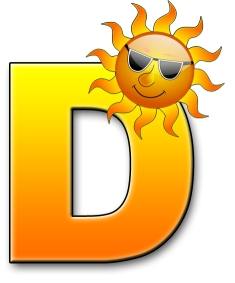Vitamin D and Your Health

If you guessed Vit. D pat yourself on the back or take a bow!
That’s right the ‘Sunshine Vitamin’ is especially important this time of year, not that it isn’t important at other times of the year. The reason? If you live anywhere that gets cold you are likely to be getting a lot less of this important vitamin. During the winter months there are fewer hours of sunshine (blame it on the Earth’s axis) and because of the cold we tend to be bundled up from head to toe when we do go outside during the daylight hours. Why is this important you ask?
Vitamin D is synthesized in the fat layers of our skin by sunlight. During the spring, summer, and most of the fall we can still get enough sun exposure to help with vitamin D production. But as the weather gets colder and our wardrobes cover more skin we tend to lose out on this bonus vitamin D source.
Another source of vitamin D is through food, however we don’t typically eat enough vitamin D loaded foods. Fatty fish like salmon and swordfish have decent amounts and foods like liver, egg yolks, and sardines to a lesser extent. Many foods are now fortified with vitamin D: milk, yogurt, even orange juice. This fortification of foods has helped with getting higher quantities of vitamin D.
In order to optimize levels of vitamin D during the winter months it is a great idea to take a quality Vit. D3 supplement. Supplementation with Vit. D3 is a good idea any time of the year, however during the late fall and winter months it should be standard protocol.
As we get older our bodies are not as efficient at synthesizing or absorbing vitamin D so supplementation after 50 years old is also a necessity.
Vitamin D is so important because it is a key component in numerous functions in the body and for optimal health.
- Calcium absorption
- Bone mineralization and growth
- Prevents osteoporosis
- Prevents rickets in children and osteomalacia in adults
- May help in reduction certain cancers (especially colon)
- May help prevention of type II diabetes
- Reduce the risk of MS
- Prevention of hypertension and heart disease
- May reduce the risk of developing Alzheimer’s and dementia
- Reduces the risk of getting the flu (bolsters immune function)
Have you ever wondered why cold and flu season isn’t rampant in July? If you are connecting the dots: as the weather gets colder and we get less sun exposure our vitamin D levels are not optimal. This can aid in a depressed immune response when exposed to cold and flu viruses. By supplementing with vitamin D during the winter months we can help our immune system be at its best naturally.
Please feel free to ask us about which Vitamin D products we would recommend for you or your family and in what quantities.
Dr. Cory Thiele
Thiele Chiropractic & Wellness
5010 Mills Civic Pkwy #102
West Des Moines, Iowa
(515)-777-9771
http://www.ncbi.nlm.nih.gov/pubmed/21876081
http://www.ncbi.nlm.nih.gov/pubmed/20473927
http://www.ncbi.nlm.nih.gov/pubmed/20056631
http://www.ncbi.nlm.nih.gov/pubmed/20093284
http://www.ncbi.nlm.nih.gov/pubmed/24445558
http://www.ncbi.nlm.nih.gov/pubmed/18180395?dopt=Citation
http://www.neurology.org/content/early/2014/08/06/WNL.0000000000000755

